2024届高考英语语法复习动词时态课件(共57张PPT)
文档属性
| 名称 | 2024届高考英语语法复习动词时态课件(共57张PPT) |

|
|
| 格式 | pptx | ||
| 文件大小 | 311.4MB | ||
| 资源类型 | 教案 | ||
| 版本资源 | 其它版本 | ||
| 科目 | 英语 | ||
| 更新时间 | 2024-05-07 00:00:00 | ||
图片预览

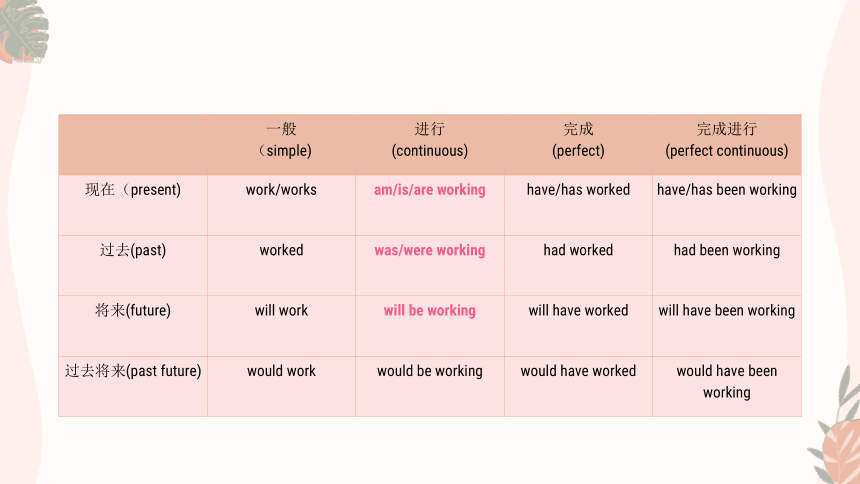
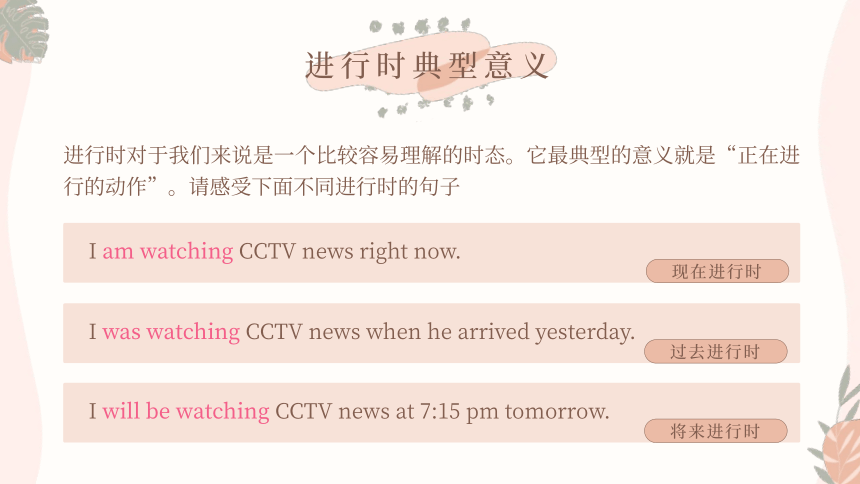
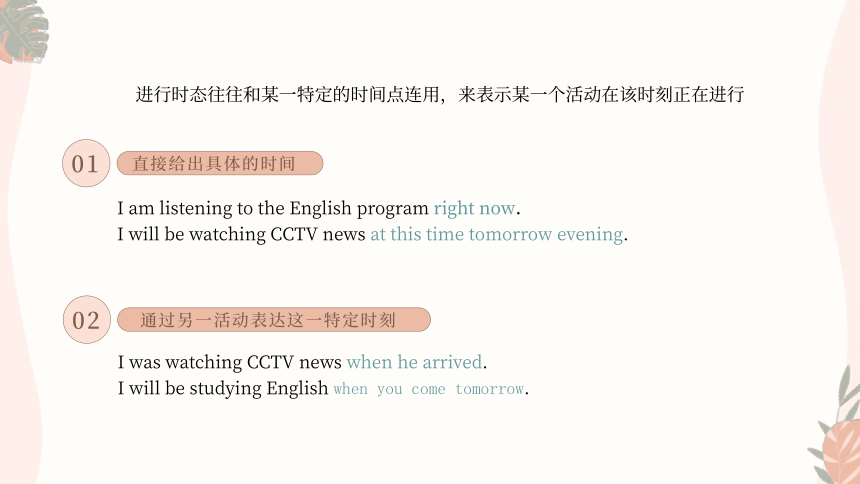

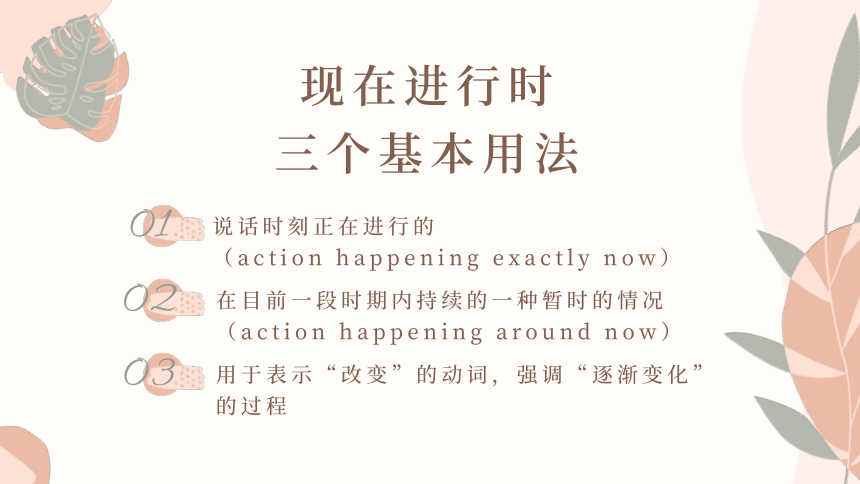
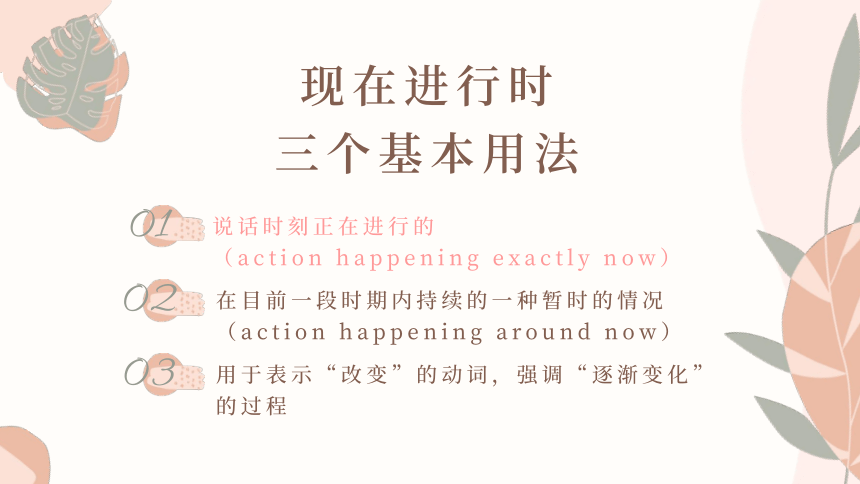
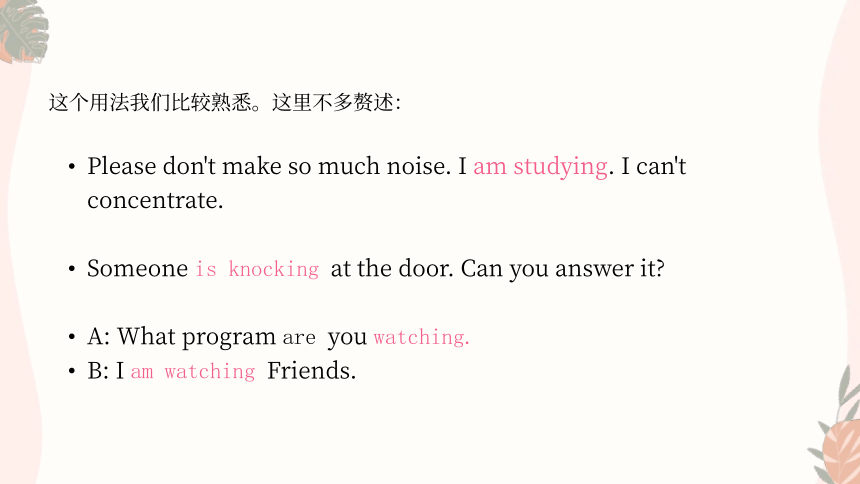

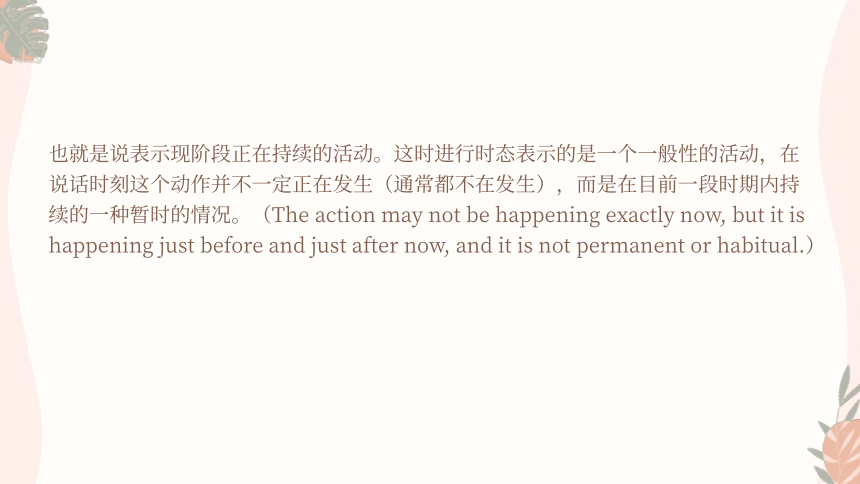
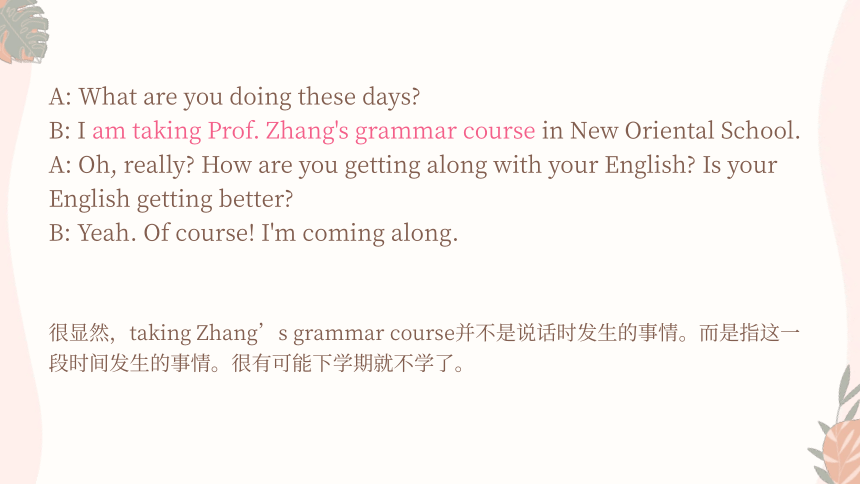
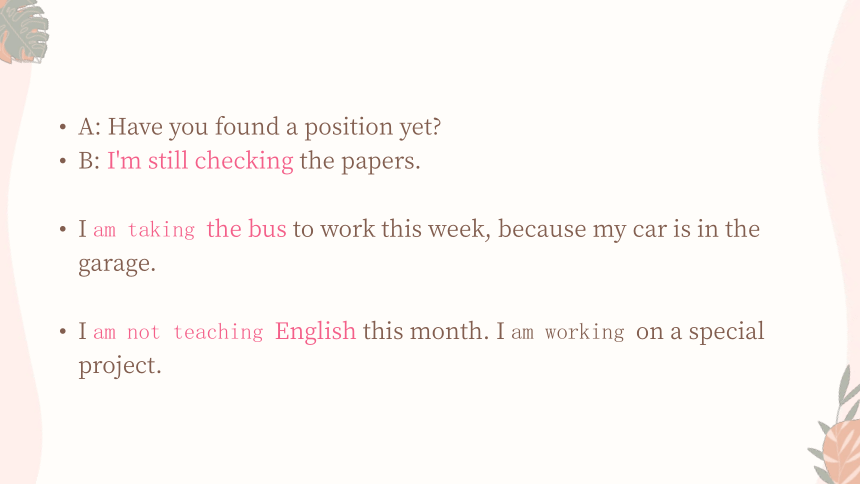
文档简介
(共57张PPT)
进行时
Ccontinuous Tense
< 现在进行时丨过去进行时丨将来进行时 >
一般 (simple) 进行 (continuous) 完成 (perfect) 完成进行
(perfect continuous)
现在(present) work/works am/is/are working have/has worked have/has been working
过去(past) worked was/were working had worked had been working
将来(future) will work will be working will have worked will have been working
过去将来(past future) would work would be working would have worked would have been working
进行时典型意义
I am watching CCTV news right now.
现在进行时
I was watching CCTV news when he arrived yesterday.
过去进行时
I will be watching CCTV news at 7:15 pm tomorrow.
将来进行时
进行时对于我们来说是一个比较容易理解的时态。它最典型的意义就是“正在进行的动作”。请感受下面不同进行时的句子
01
I am listening to the English program right now.
I will be watching CCTV news at this time tomorrow evening.
02
直接给出具体的时间
通过另一活动表达这一特定时刻
进行时态往往和某一特定的时间点连用,来表示某一个活动在该时刻正在进行
I was watching CCTV news when he arrived.
I will be studying English when you come tomorrow.
现在进行时
现在进行时
三个基本用法
01
说话时刻正在进行的
(action happening exactly now)
在目前一段时期内持续的一种暂时的情况(action happening around now)
用于表示“改变”的动词,强调“逐渐变化”的过程
02
03
现在进行时
三个基本用法
01
说话时刻正在进行的
(action happening exactly now)
在目前一段时期内持续的一种暂时的情况(action happening around now)
用于表示“改变”的动词,强调“逐渐变化”的过程
02
03
这个用法我们比较熟悉。这里不多赘述:
Please don't make so much noise. I am studying. I can't concentrate.
Someone is knocking at the door. Can you answer it
A: What program are you watching.
B: I am watching Friends.
现在进行时
三个基本用法
01
说话时刻正在进行的
(action happening exactly now)
在目前一段时期内持续的一种暂时的情况(action happening around now)
用于表示“改变”的动词,强调“逐渐变化”的过程
02
03
也就是说表示现阶段正在持续的活动。这时进行时态表示的是一个一般性的活动,在说话时刻这个动作并不一定正在发生(通常都不在发生),而是在目前一段时期内持续的一种暂时的情况。(The action may not be happening exactly now, but it is happening just before and just after now, and it is not permanent or habitual.)
A: What are you doing these days
B: I am taking Prof. Zhang's grammar course in New Oriental School.
A: Oh, really How are you getting along with your English Is your
English getting better
B: Yeah. Of course! I'm coming along.
很显然,taking Zhang’s grammar course并不是说话时发生的事情。而是指这一段时间发生的事情。很有可能下学期就不学了。
A: Have you found a position yet
B: I'm still checking the papers.
I am taking the bus to work this week, because my car is in the garage.
I am not teaching English this month. I am working on a special project.
现在进行时
三个基本用法
01
说话时刻正在进行的
(action happening exactly now)
在目前一段时期内持续的一种暂时的情况(action happening around now)
用于表示“改变”的动词,强调“逐渐变化”的过程
02
03
It's getting dark.
Mom is getting old.
His health is deteriorating.
My dream is coming true.
I think Jenny's getting cold feet!
Exercise:
1.The cold air______(chill) me to the bone. Please turn off the air conditioner.
2.Lee's grandmother______(keep) in step with modern technology. She bought herself a computer.
3.Please don't disturb her. She______(sleep).
4.I______(not, teach) this month. I______(work) on a special project.
5.English schools______(boom) nowadays. A new school______(open) every day.
Exercise:
6.Todd______(not, have) a car, so he______(take) a train home on weekends.
7.Todd has his own car, but he______(take) a train home this week.
8.She prefers a place of her own; for the time being, however, she______(stay) with her aunt.
9.These days Grace______(study) to prepare herself for the big English exam.
现在进行时
其他用法
04
用于强烈的感彩的表达
表示确定的时间安排(在“一般将来时”时我们也讨论过)
与always等连用,表示多次重复,且含有感彩
05
06
现在进行时
其他用法
04
用于强烈的感彩的表达
表示确定的时间安排(一般将来时时我们也讨论过)
与always等连用,表示多次重复,且含有感彩
05
06
感受一下下面说话的语气,想象一下说话的场景:
What are we waiting for then Let's get started. (可能不耐烦)
I'm not having this conversation with you.
You're not asking me to marry you, are you (惊讶怀疑)
The bank is only paying me 3 percent interest on my money.(愤怒)
You are asking too much!
现在进行时
其他用法
04
用于强烈的感彩的表达
表示确定的时间安排(一般将来时时我们也讨论过)
与always等连用,表示多次重复,且含有感彩
05
06
We're eating in a restaurant tonight. (我已经订了餐厅)
I am taking a makeup test tomorrow. (我已经明确收到补考通知了)
具体情况和一般将来时对比。
现在进行时
其他用法
04
用于强烈的感彩的表达
表示确定的时间安排(一般将来时时我们也讨论过)
与always等连用,表示多次重复,且含有感彩
05
06
现在进行时的感彩的表达,还有另外一种用法,就是常与 always, forever, contiually和constantly等连用,表示多次重复的行为。这种反复的行为可以是积极的、让人喜欢的事情。也往往表示让说话者厌烦、感觉不合情理或使人不愉快的事,
即通常具有负面的、消极的含义。感受一下下面例句:
Scott is very generous. He's always giving his friends gifts and inviting them out for meals.
Although Steve is a teacher, in a sense he is a student as well. He is always learning things from his students.
He's always pulling my leg. He likes joking me.
My wife is forever looking for her keys.
He's always messing up the kitchen!
练习:分析下列对话中进行时态的意义和用法
1.My little brother is always bugging me. I wish he'd leave me
alone.
2.Jack is always borrowing money and forgetting to pay you back.
3.A: Would you like to go to the movies with Lois and me on
Friday
B: I wish I could, but I'm having dinner at my brother's.
4.A: My parents are coming to see our apartment this weekend.
B: Looks as if I'd better lend you my vacuum cleaner then.
5.A: I'm begging you to give me another chance, Sam!
B: No. It's over. I'm sorry.
练习:分析下列对话中进行时态的意义和用法
6.A: My company is flying me out to Hawaii on business next
week.
B: That's great. Where are they putting you up
7.A: We are having a party at our house on the weekend of the
30th. Would you like to join us
B: That sounds like a lot of fun. But I'll need to check my calendar
first.
过去进行时
过去进行时
01
过去进行时常见用法:设置故事背景
过去进行时常见用法:设置故事背景
02
03
过去进行时口语用法:表示委婉的请求或提建议
04
过去进行时 vs 一般过去时(过去进行时使用时的时间状语)
过去进行时
01
过去进行时常见用法:设置故事背景
过去进行时常见用法:设置故事背景
02
03
过去进行时口语用法:表示委婉的请求或提建议
04
过去进行时 vs 一般过去时(过去进行时使用时的时间状语)
过去进行时典型用法:
描述一个过去的特定时刻正在发生的事情下·
I was discussing my thesis with my director at this time last night.
A: What were you doing at 10 o'clock last night
B: I was having dinner with my friends.
A: Where were you last night
B: I was reading in the library.
这个用法我们都比较熟悉,大家回顾一下就好:
过去进行时
01
过去进行时常见用法:设置故事背景
过去进行时常见用法:设置故事背景
02
03
过去进行时口语用法:表示委婉的请求或提建议
04
过去进行时 vs 一般过去时(过去进行时使用时的时间状语)
在最开始讨论现在时的时候,我们就讨论过,现在时最典型的意义就是“正在进行的动作”。所以,过去完成时最典型的意义就是“过去某个时间段,正在进行的动作”。
在使用过去进行时的时候,我们通常都会给予一个过去的具体时间点,或通过另一活动表达这一特定过去时间。所以我们通常会见到“过去进行时”和“一般过去时”配合使用:
I was watching TV when the telephone rang.
I was walking past the car when it exploded.
I was cooking dinner last night when I cut my finger.
I was telephoning Harry when she arrived.
“过去进行时”与“一般现在时”连用
刚刚的讨论中,我们知道通常主句用过去进行时,从句用一般过去时。那么,我们现在再来看看,主句和从句的动作长度:
I was watching TV when the telephone rang.
I was walking past the car when it exploded.
I was cooking dinner last night when I cut my finger.
I was telephoning Harry when she arrived.
我们可以,从句(一般过去时)的动作比较短,主句(过去进行时)的动作比较长。
所以我们得出一个结论:
用过去进行时时,动作持续比较长。
用一般过去时时,动作持续比较短。
注意:长短动作是相对的。不是绝对的。
“过去进行时”与“一般现在时”连用
那么,下面这句话正确吗?
I cooked dinner last night when I was cutting my finger.
刚刚我们讨论过,“过去进行时”相对“一般现在时”来说较长。但是如果我们反过来(上面的例句),就会变成“我(一直)在切手指,(顺便)煮个饭”,突然变成了“惊悚剧”。这句不符合事实。
“过去进行时”与“一般现在时”连用
那么,从句就一定不能用“进行时”吗?
我们来看下面这个句子:
The car exploded when I was walking past it.
很显然, exploed的动作相比于walk的动作较短,所以这里我们主句用过去时,从句用过去进行时。
“过去进行时”与“一般现在时”连用
“过去进行时” 与“过去进行时”连用
在刚刚讨论中我们知道:
动作比较短,我们用一般现在时;动作比较长,我们用过去进行时。
那如果两个动作对比起来都相对比较长呢?很显然,两个都使用“过去进行时”
While I was studying in my dorm, my roommates were talking loudly with their friends.
While I was studying last night, my wife was watching TV.
练习:分析下列对话中进行时态的意义和用法
While divers______(work) off the coast of Florida, they______(discover) a 100-year-old shipwreck. The shipwreck______(contain) gold bars worth $2 million.
The divers______(film) life on a coral reef when suddenly they______(find) the gold.
练习:分析下列对话中进行时态的意义和用法
The flight______(fly) from London to New York when it
suddenly______(encounter) turbulence and______(drop) 15,000 feet. The
plane______(carry) over 300 passengers and a crew of 17.
练习:分析下列对话中进行时态的意义和用法
A: What an awful story! A couple______(sail) their yacht from Hawaii to Mexico. While they______(cross) the Pacific, their boat______(hit) a whale and______(sink)!
B: Is that true What happened to the whale
A: It doesn't say.
过去进行时
01
过去进行时常见用法:设置故事背景
过去进行时常见用法:设置故事背景
02
03
过去进行时口语用法:表示委婉的请求或提建议
04
过去进行时 vs 一般过去时(过去进行时使用时的时间状语)
过去进行时常见用法:
设置故事背景
在讲故事时,我们往往会用到过去进行时态(the past continuous tense)was/were doing来设置故事发生的过去背景(We often use the past continuous tense to "set the scene" in stories.)这是因为进行时态往往表示一个在持续的活动场景,所以用它来铺垫故事的背景,往往会 给读者一种身临其境的感觉。
过去进行时常见用法:
设置故事背景
It was getting darker. The rain was beating on the windows. The wind was rising. A wood fire was burning on the hearth, and a cat was sleeping in front of it. A girl was playing the piano and was singing softly to herself. Suddenly, there was a knock on the door,......
过去进行时常见用法:
设置故事背景
James Bond was driving through town. It was raining. The wind was blowing hard. Nobody was walking in the streets. Suddenly, Bond saw the killer in a telephone box.
过去进行时
01
过去进行时常见用法:设置故事背景
过去进行时常见用法:设置故事背景
02
03
过去进行时口语用法:表示委婉的请求或提建议
04
过去进行时 vs 一般过去时(过去进行时使用时的时间状语)
过去进行时口语用法:
表示委婉的请求或提建议
I was wondering if you'd like to lend me your car.
I was wondering if you could lend me your car.
I was hoping that you'd like to lend me your car.
I was thinking that you'd like to lend me your car.
练习:分析下列对话中进行时态的意义和用法
1.I______(walk) along the street when suddenly I______(hear) footsteps behind me. Somebody (follow) me. I was frightened and I started to run.
2.When I______(walk) in the rain, I suddenly______(see) a beautiful rainbow.
3.While we______(watch) the play, an usher______(come) over to us to check our tickets.
4.Sarah______(demonstrate) a dance step when she______(trip) on a rug and fell.
5.While I______(work) in the garden, my wife______(cook) dinner.
练习:分析下列对话中进行时态的意义和用法
6.It______(rain) hard, but no one stopped working.
7.I______(fall) asleep while I______(read) the novel.
8.—What______you______(do) at 7:15 yesterday evening
— I______(watch) CCTV news then.
9.I______(see) you in the park yesterday afternoon. You______(sit) on the grass and______(talk) with some people.
将来进行时
将来进行时
01
典型用法:将来某一特定时刻正在持续的事
用在疑问句中,表示客气地询问
02
03
口语用法:将来计划好的事
典型用法:
将来某一特定时刻正在持续的事
A: When do you leave for Hainan
B: Tomorrow. Just think, two days from now I will be lying on the beach in the sun.
A: Sounds great!
Don't telephone me after eight tomorrow—I'll be having a meeting.
Wait until seven o'clock so that they won't still be eating.
这个用法我们都比较熟悉,大家回顾一下就好:
口语用法:将来计划好的事
Professor Smith will be giving a lecture on American literature tomorrow evening.
口语用法:将来计划好的事
现在进行时 VS 将来进行时
相同点:
表示计划好的事情,两者区别不大,可以相互替换。
He is taking/will be taking a makeup test next week.
He isn't coming/won't be coming to the party.
口语用法:将来计划好的事
现在进行时 VS 将来进行时
不同点:
1.现在进行时只表示最近的将来;而将来进行时既可以表示最近的将来,也可表示较远的将来。
1) I am meeting him tomorrow. 我明天要见他。
2) will be meeting him tomorrow/next year. 我明天/明年要见他。
2.现在进行时表示最近将来的动作时,必须有确定的表示将来的时间状语;而将来进行时则没有这种限制。
1) He's working in this room next Monday.
2) He'll be working in this room.
用在疑问句中,表示客气地询问
为何收银员问顾客付款方式时,说的是How will you be paying for this
而不是直接用How will you pay for this
用“将来进行时态(will be doing)”来“礼貌地询问”,显得比一般将来时will do更委婉客气。
这是因为will be doing常表示很客观地询问事实,并不想干涉对方的决定;
而will do往往带有各种感彩,如请求、命令、指示、质问甚或威胁等等。
用在疑问句中,表示客气地询问
Guest: Good evening. My name is Jennifer Thomson. I've just
arrived from Canada.
Receptionist: Welcome to our hotel, Ms. Thomson. Are you on holiday
Guest: No, on business.
Receptionist: I see, and how long will you be staying
Guest: My reservation is for a week in a standard room.
Receptionist: Thank you, Ms. Thomson. And how will you be paying
Guest: By company credit card.
用在疑问句中,表示客气地询问
Last week at a dinner party, the hostess asked me to sit next to Mrs. Rumbold. Mrs. Rumbold was a large, unsmiling lady in a tight black dress. She did not look up when I took my seat beside her. Her eyes werefixed on her plate and in a short time, she was busy eating. I tried to make conversation.
"A new play is coming to 'The Globe' soon," I said. "Will you be seeing it "
"No," she answered.
"Will you be spending your holidays abroad this year " I asked.
"No," she answered.
"Will you be staying in England " I asked.
"No," she answered.
In despair, I asked her whether she was enjoying her dinner. "Young man," she answered, "if you ate more and talked less, we would both enjoy our dinner!"
用在疑问句中,表示客气地询问
When will she be contacting me
Will you be staying in this evening
When will you be paying back the money
用在疑问句中,表示客气地询问
When will she be contacting me
Will you be staying in this evening
When will you be paying back the money
然而,这并不是说以后我们就不用will do来提问了,而一律用will be doing代替will do。因为前面我们说过,will do往往带有各种感彩,比如表达“请求”,此时我们就得用will do,而一般不用will be doing。比如“你能借给我10块钱吗?”这句话,一般不说: Will you be lending me ten dollars
这里的will不是在客观地询问事实,而是表示一种请求,所以,
我们要说: Will you lend me ten dollars
进行时
Ccontinuous Tense
< 现在进行时丨过去进行时丨将来进行时 >
一般 (simple) 进行 (continuous) 完成 (perfect) 完成进行
(perfect continuous)
现在(present) work/works am/is/are working have/has worked have/has been working
过去(past) worked was/were working had worked had been working
将来(future) will work will be working will have worked will have been working
过去将来(past future) would work would be working would have worked would have been working
进行时典型意义
I am watching CCTV news right now.
现在进行时
I was watching CCTV news when he arrived yesterday.
过去进行时
I will be watching CCTV news at 7:15 pm tomorrow.
将来进行时
进行时对于我们来说是一个比较容易理解的时态。它最典型的意义就是“正在进行的动作”。请感受下面不同进行时的句子
01
I am listening to the English program right now.
I will be watching CCTV news at this time tomorrow evening.
02
直接给出具体的时间
通过另一活动表达这一特定时刻
进行时态往往和某一特定的时间点连用,来表示某一个活动在该时刻正在进行
I was watching CCTV news when he arrived.
I will be studying English when you come tomorrow.
现在进行时
现在进行时
三个基本用法
01
说话时刻正在进行的
(action happening exactly now)
在目前一段时期内持续的一种暂时的情况(action happening around now)
用于表示“改变”的动词,强调“逐渐变化”的过程
02
03
现在进行时
三个基本用法
01
说话时刻正在进行的
(action happening exactly now)
在目前一段时期内持续的一种暂时的情况(action happening around now)
用于表示“改变”的动词,强调“逐渐变化”的过程
02
03
这个用法我们比较熟悉。这里不多赘述:
Please don't make so much noise. I am studying. I can't concentrate.
Someone is knocking at the door. Can you answer it
A: What program are you watching.
B: I am watching Friends.
现在进行时
三个基本用法
01
说话时刻正在进行的
(action happening exactly now)
在目前一段时期内持续的一种暂时的情况(action happening around now)
用于表示“改变”的动词,强调“逐渐变化”的过程
02
03
也就是说表示现阶段正在持续的活动。这时进行时态表示的是一个一般性的活动,在说话时刻这个动作并不一定正在发生(通常都不在发生),而是在目前一段时期内持续的一种暂时的情况。(The action may not be happening exactly now, but it is happening just before and just after now, and it is not permanent or habitual.)
A: What are you doing these days
B: I am taking Prof. Zhang's grammar course in New Oriental School.
A: Oh, really How are you getting along with your English Is your
English getting better
B: Yeah. Of course! I'm coming along.
很显然,taking Zhang’s grammar course并不是说话时发生的事情。而是指这一段时间发生的事情。很有可能下学期就不学了。
A: Have you found a position yet
B: I'm still checking the papers.
I am taking the bus to work this week, because my car is in the garage.
I am not teaching English this month. I am working on a special project.
现在进行时
三个基本用法
01
说话时刻正在进行的
(action happening exactly now)
在目前一段时期内持续的一种暂时的情况(action happening around now)
用于表示“改变”的动词,强调“逐渐变化”的过程
02
03
It's getting dark.
Mom is getting old.
His health is deteriorating.
My dream is coming true.
I think Jenny's getting cold feet!
Exercise:
1.The cold air______(chill) me to the bone. Please turn off the air conditioner.
2.Lee's grandmother______(keep) in step with modern technology. She bought herself a computer.
3.Please don't disturb her. She______(sleep).
4.I______(not, teach) this month. I______(work) on a special project.
5.English schools______(boom) nowadays. A new school______(open) every day.
Exercise:
6.Todd______(not, have) a car, so he______(take) a train home on weekends.
7.Todd has his own car, but he______(take) a train home this week.
8.She prefers a place of her own; for the time being, however, she______(stay) with her aunt.
9.These days Grace______(study) to prepare herself for the big English exam.
现在进行时
其他用法
04
用于强烈的感彩的表达
表示确定的时间安排(在“一般将来时”时我们也讨论过)
与always等连用,表示多次重复,且含有感彩
05
06
现在进行时
其他用法
04
用于强烈的感彩的表达
表示确定的时间安排(一般将来时时我们也讨论过)
与always等连用,表示多次重复,且含有感彩
05
06
感受一下下面说话的语气,想象一下说话的场景:
What are we waiting for then Let's get started. (可能不耐烦)
I'm not having this conversation with you.
You're not asking me to marry you, are you (惊讶怀疑)
The bank is only paying me 3 percent interest on my money.(愤怒)
You are asking too much!
现在进行时
其他用法
04
用于强烈的感彩的表达
表示确定的时间安排(一般将来时时我们也讨论过)
与always等连用,表示多次重复,且含有感彩
05
06
We're eating in a restaurant tonight. (我已经订了餐厅)
I am taking a makeup test tomorrow. (我已经明确收到补考通知了)
具体情况和一般将来时对比。
现在进行时
其他用法
04
用于强烈的感彩的表达
表示确定的时间安排(一般将来时时我们也讨论过)
与always等连用,表示多次重复,且含有感彩
05
06
现在进行时的感彩的表达,还有另外一种用法,就是常与 always, forever, contiually和constantly等连用,表示多次重复的行为。这种反复的行为可以是积极的、让人喜欢的事情。也往往表示让说话者厌烦、感觉不合情理或使人不愉快的事,
即通常具有负面的、消极的含义。感受一下下面例句:
Scott is very generous. He's always giving his friends gifts and inviting them out for meals.
Although Steve is a teacher, in a sense he is a student as well. He is always learning things from his students.
He's always pulling my leg. He likes joking me.
My wife is forever looking for her keys.
He's always messing up the kitchen!
练习:分析下列对话中进行时态的意义和用法
1.My little brother is always bugging me. I wish he'd leave me
alone.
2.Jack is always borrowing money and forgetting to pay you back.
3.A: Would you like to go to the movies with Lois and me on
Friday
B: I wish I could, but I'm having dinner at my brother's.
4.A: My parents are coming to see our apartment this weekend.
B: Looks as if I'd better lend you my vacuum cleaner then.
5.A: I'm begging you to give me another chance, Sam!
B: No. It's over. I'm sorry.
练习:分析下列对话中进行时态的意义和用法
6.A: My company is flying me out to Hawaii on business next
week.
B: That's great. Where are they putting you up
7.A: We are having a party at our house on the weekend of the
30th. Would you like to join us
B: That sounds like a lot of fun. But I'll need to check my calendar
first.
过去进行时
过去进行时
01
过去进行时常见用法:设置故事背景
过去进行时常见用法:设置故事背景
02
03
过去进行时口语用法:表示委婉的请求或提建议
04
过去进行时 vs 一般过去时(过去进行时使用时的时间状语)
过去进行时
01
过去进行时常见用法:设置故事背景
过去进行时常见用法:设置故事背景
02
03
过去进行时口语用法:表示委婉的请求或提建议
04
过去进行时 vs 一般过去时(过去进行时使用时的时间状语)
过去进行时典型用法:
描述一个过去的特定时刻正在发生的事情下·
I was discussing my thesis with my director at this time last night.
A: What were you doing at 10 o'clock last night
B: I was having dinner with my friends.
A: Where were you last night
B: I was reading in the library.
这个用法我们都比较熟悉,大家回顾一下就好:
过去进行时
01
过去进行时常见用法:设置故事背景
过去进行时常见用法:设置故事背景
02
03
过去进行时口语用法:表示委婉的请求或提建议
04
过去进行时 vs 一般过去时(过去进行时使用时的时间状语)
在最开始讨论现在时的时候,我们就讨论过,现在时最典型的意义就是“正在进行的动作”。所以,过去完成时最典型的意义就是“过去某个时间段,正在进行的动作”。
在使用过去进行时的时候,我们通常都会给予一个过去的具体时间点,或通过另一活动表达这一特定过去时间。所以我们通常会见到“过去进行时”和“一般过去时”配合使用:
I was watching TV when the telephone rang.
I was walking past the car when it exploded.
I was cooking dinner last night when I cut my finger.
I was telephoning Harry when she arrived.
“过去进行时”与“一般现在时”连用
刚刚的讨论中,我们知道通常主句用过去进行时,从句用一般过去时。那么,我们现在再来看看,主句和从句的动作长度:
I was watching TV when the telephone rang.
I was walking past the car when it exploded.
I was cooking dinner last night when I cut my finger.
I was telephoning Harry when she arrived.
我们可以,从句(一般过去时)的动作比较短,主句(过去进行时)的动作比较长。
所以我们得出一个结论:
用过去进行时时,动作持续比较长。
用一般过去时时,动作持续比较短。
注意:长短动作是相对的。不是绝对的。
“过去进行时”与“一般现在时”连用
那么,下面这句话正确吗?
I cooked dinner last night when I was cutting my finger.
刚刚我们讨论过,“过去进行时”相对“一般现在时”来说较长。但是如果我们反过来(上面的例句),就会变成“我(一直)在切手指,(顺便)煮个饭”,突然变成了“惊悚剧”。这句不符合事实。
“过去进行时”与“一般现在时”连用
那么,从句就一定不能用“进行时”吗?
我们来看下面这个句子:
The car exploded when I was walking past it.
很显然, exploed的动作相比于walk的动作较短,所以这里我们主句用过去时,从句用过去进行时。
“过去进行时”与“一般现在时”连用
“过去进行时” 与“过去进行时”连用
在刚刚讨论中我们知道:
动作比较短,我们用一般现在时;动作比较长,我们用过去进行时。
那如果两个动作对比起来都相对比较长呢?很显然,两个都使用“过去进行时”
While I was studying in my dorm, my roommates were talking loudly with their friends.
While I was studying last night, my wife was watching TV.
练习:分析下列对话中进行时态的意义和用法
While divers______(work) off the coast of Florida, they______(discover) a 100-year-old shipwreck. The shipwreck______(contain) gold bars worth $2 million.
The divers______(film) life on a coral reef when suddenly they______(find) the gold.
练习:分析下列对话中进行时态的意义和用法
The flight______(fly) from London to New York when it
suddenly______(encounter) turbulence and______(drop) 15,000 feet. The
plane______(carry) over 300 passengers and a crew of 17.
练习:分析下列对话中进行时态的意义和用法
A: What an awful story! A couple______(sail) their yacht from Hawaii to Mexico. While they______(cross) the Pacific, their boat______(hit) a whale and______(sink)!
B: Is that true What happened to the whale
A: It doesn't say.
过去进行时
01
过去进行时常见用法:设置故事背景
过去进行时常见用法:设置故事背景
02
03
过去进行时口语用法:表示委婉的请求或提建议
04
过去进行时 vs 一般过去时(过去进行时使用时的时间状语)
过去进行时常见用法:
设置故事背景
在讲故事时,我们往往会用到过去进行时态(the past continuous tense)was/were doing来设置故事发生的过去背景(We often use the past continuous tense to "set the scene" in stories.)这是因为进行时态往往表示一个在持续的活动场景,所以用它来铺垫故事的背景,往往会 给读者一种身临其境的感觉。
过去进行时常见用法:
设置故事背景
It was getting darker. The rain was beating on the windows. The wind was rising. A wood fire was burning on the hearth, and a cat was sleeping in front of it. A girl was playing the piano and was singing softly to herself. Suddenly, there was a knock on the door,......
过去进行时常见用法:
设置故事背景
James Bond was driving through town. It was raining. The wind was blowing hard. Nobody was walking in the streets. Suddenly, Bond saw the killer in a telephone box.
过去进行时
01
过去进行时常见用法:设置故事背景
过去进行时常见用法:设置故事背景
02
03
过去进行时口语用法:表示委婉的请求或提建议
04
过去进行时 vs 一般过去时(过去进行时使用时的时间状语)
过去进行时口语用法:
表示委婉的请求或提建议
I was wondering if you'd like to lend me your car.
I was wondering if you could lend me your car.
I was hoping that you'd like to lend me your car.
I was thinking that you'd like to lend me your car.
练习:分析下列对话中进行时态的意义和用法
1.I______(walk) along the street when suddenly I______(hear) footsteps behind me. Somebody (follow) me. I was frightened and I started to run.
2.When I______(walk) in the rain, I suddenly______(see) a beautiful rainbow.
3.While we______(watch) the play, an usher______(come) over to us to check our tickets.
4.Sarah______(demonstrate) a dance step when she______(trip) on a rug and fell.
5.While I______(work) in the garden, my wife______(cook) dinner.
练习:分析下列对话中进行时态的意义和用法
6.It______(rain) hard, but no one stopped working.
7.I______(fall) asleep while I______(read) the novel.
8.—What______you______(do) at 7:15 yesterday evening
— I______(watch) CCTV news then.
9.I______(see) you in the park yesterday afternoon. You______(sit) on the grass and______(talk) with some people.
将来进行时
将来进行时
01
典型用法:将来某一特定时刻正在持续的事
用在疑问句中,表示客气地询问
02
03
口语用法:将来计划好的事
典型用法:
将来某一特定时刻正在持续的事
A: When do you leave for Hainan
B: Tomorrow. Just think, two days from now I will be lying on the beach in the sun.
A: Sounds great!
Don't telephone me after eight tomorrow—I'll be having a meeting.
Wait until seven o'clock so that they won't still be eating.
这个用法我们都比较熟悉,大家回顾一下就好:
口语用法:将来计划好的事
Professor Smith will be giving a lecture on American literature tomorrow evening.
口语用法:将来计划好的事
现在进行时 VS 将来进行时
相同点:
表示计划好的事情,两者区别不大,可以相互替换。
He is taking/will be taking a makeup test next week.
He isn't coming/won't be coming to the party.
口语用法:将来计划好的事
现在进行时 VS 将来进行时
不同点:
1.现在进行时只表示最近的将来;而将来进行时既可以表示最近的将来,也可表示较远的将来。
1) I am meeting him tomorrow. 我明天要见他。
2) will be meeting him tomorrow/next year. 我明天/明年要见他。
2.现在进行时表示最近将来的动作时,必须有确定的表示将来的时间状语;而将来进行时则没有这种限制。
1) He's working in this room next Monday.
2) He'll be working in this room.
用在疑问句中,表示客气地询问
为何收银员问顾客付款方式时,说的是How will you be paying for this
而不是直接用How will you pay for this
用“将来进行时态(will be doing)”来“礼貌地询问”,显得比一般将来时will do更委婉客气。
这是因为will be doing常表示很客观地询问事实,并不想干涉对方的决定;
而will do往往带有各种感彩,如请求、命令、指示、质问甚或威胁等等。
用在疑问句中,表示客气地询问
Guest: Good evening. My name is Jennifer Thomson. I've just
arrived from Canada.
Receptionist: Welcome to our hotel, Ms. Thomson. Are you on holiday
Guest: No, on business.
Receptionist: I see, and how long will you be staying
Guest: My reservation is for a week in a standard room.
Receptionist: Thank you, Ms. Thomson. And how will you be paying
Guest: By company credit card.
用在疑问句中,表示客气地询问
Last week at a dinner party, the hostess asked me to sit next to Mrs. Rumbold. Mrs. Rumbold was a large, unsmiling lady in a tight black dress. She did not look up when I took my seat beside her. Her eyes werefixed on her plate and in a short time, she was busy eating. I tried to make conversation.
"A new play is coming to 'The Globe' soon," I said. "Will you be seeing it "
"No," she answered.
"Will you be spending your holidays abroad this year " I asked.
"No," she answered.
"Will you be staying in England " I asked.
"No," she answered.
In despair, I asked her whether she was enjoying her dinner. "Young man," she answered, "if you ate more and talked less, we would both enjoy our dinner!"
用在疑问句中,表示客气地询问
When will she be contacting me
Will you be staying in this evening
When will you be paying back the money
用在疑问句中,表示客气地询问
When will she be contacting me
Will you be staying in this evening
When will you be paying back the money
然而,这并不是说以后我们就不用will do来提问了,而一律用will be doing代替will do。因为前面我们说过,will do往往带有各种感彩,比如表达“请求”,此时我们就得用will do,而一般不用will be doing。比如“你能借给我10块钱吗?”这句话,一般不说: Will you be lending me ten dollars
这里的will不是在客观地询问事实,而是表示一种请求,所以,
我们要说: Will you lend me ten dollars
同课章节目录
- 名词
- 动词/动词短语
- 一般现在时及其被动式
- 一般过去时及其被动式
- 现在进行时及其被动式
- 过去进行时及其被动式
- 将来进行时及其被动式
- 现在完成时及其被动式
- 过去完成时及其被动式
- 一般将来时及其被动式
- 过去将来时及其被动式
- 现在完成进行时及其被动式
- 将来完成时及其被动式
- 副词
- 介词/介词短语
- 连词/连接词
- 数词/量词
- 冠词
- 形容词
- 非谓语动词
- 句型
- 简单句与并列句
- 复合句
- 主谓一致
- 倒装与省略
- 强调句
- 虚拟语气
- 插入语
- 固定句型
- 祈使句/感叹句
- 疑问句/反义疑问句
- 非限制性定语从句
- 句型转换
- 定语从句
- 表语从句
- 宾语从句
- 主语从句
- 动词时态与语态
- 虚拟语气与情态动词
- 主谓一致
- 独立主格结构、with的复合结构
- 情态动词
- 状语从句
- 定语从句
- 特殊句式
- 交际用语
- 代词/不定代词
- 名词性从句
- 同位语从句
- 表语从句
- 宾语从句
- 主语从句
- 直接引语和间接引语
- 构词法(word formation)
